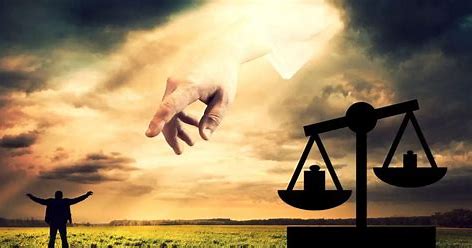The June 2022 Watchtower Article 24 titled “Jehovah—The Greatest
Forgiver” attempts to paint a picture of Jehovah as a wise, just, and
knowledgeable judge – which, of course He is. However, it also shows Him as a judge who has a number of requirements before He will forgive.
The article quotes numerous Old Testament scriptures showing
that Jehovah will forgive our transgressions and agrees that this forgiveness
is made possible through Jesus dying for our sins, though it doesn’t mention
the covenant this sacrifice generated. As Christians we would understand that
Jesus’ sacrifice, the shedding of His blood, pays for our sins so that a just
God can be merciful and forgive them; the price for those sins has
already been paid (1 Cor 6 v 20, Heb 9 v 22).
In contrast, the Watchtower article talks of there
being other requirements for Jehovah’s forgiveness. It states that,
before Jehovah will decide to offer forgiveness, “He needs to be able to
consider all the relevant facts" (Emphasis mine).
Such 'relevant facts' include "... his [the
sinner's] genetic makeup, upbringing, and environment as well
as by his emotional and mental condition" (Emphasis mine)
It also says this “He [Jehovah] fully perceives the
motivations, intentions, and desires of each person. Nothing can be hidden from
Jehovah. (Heb 4 v 13) Thus, Jehovah’s forgiveness is always based on
his complete knowledge of a situation.” (Emphasis mine)
And “…we have learned that Jehovah uses his
knowledge as our Creator, Lawgiver, and Judge when deciding whether he
will extend forgiveness” (Emphasis mine)
These requirements, that Jehovah considers, would seem
to nullify the sacrifice that Jesus made to pay for our sins. If Jehovah
needs to take in to account other aspects before granting us forgiveness this
downgrades the sacrifice. The Bible is filled with scriptures that talk
of how Jesus’ sacrifice cleanses us from all sins (1 John 1 v 9), that His
sacrifice justifies and redeems us (Titus 2 v 14, Rom 5 v 9), and, in Christ,
there is no longer any condemnation (Rom 8 v 1). Yet the Watchtower would
have us believe that this is not the whole story.
Even if Jehovah’s judgements are always fair and just this
leaves the Jehovah’s Witness in constant fear that they are not worthy of His
forgiveness. Maybe He will decide that they
do not deserve forgiveness despite their best efforts. The freedom a Christian has is in stark
contrast to this – we are not condemned and Jesus’ blood is sufficient to cover
all our sins.
We have all sinned and fallen short of God’s standards (Rom
3 v 23), but, through Jesus’ sacrifice and the covenant this ushered in, our
sins are forgiven (yes, we need to repent, but that would be a part of our
‘belief’ in Jesus as our saviour).
The article doesn’t really say what Jehovah’s forgiveness
actually achieves except that we can be ‘joyful’ in that we don’t need
to be in a ‘constant state of remorse’.
Yet being forgiven puts us back in to the wonderful relationship with
our Father that was lost in Eden, and this relationship will last forever as we
will be with Him and His Son for all eternity.
From another angle; the Watchtower elsewhere teaches
that the unrighteous (who have done ‘vile’ things in this life John 5 v 28,29)
will still be resurrected to their paradise earth. But, from this
article, it would appear that only those who meet Jehovah’s requirements are
forgiven – and, of course, true repentance is one of those requirements,
something a person who is practising 'vile' things will not be doing.
The article states: “Of course, it is our faith in the
sacrifice of Christ that provides the real basis for Jehovah to forgive us and
cleanse us from sin. Jehovah will extend the value of that sacrifice to
us when he sees that we are making a sincere effort to change our
course of conduct” (Emphasis mine).
As the ‘unrighteous’ would not have repented of their sins and
be making a ‘sincere effort’ to change we have to ask how are their sins
forgiven? If those people with unforgiven sins are able to enter
paradise, why do we need our sins forgiven in the first place? This is a common
paradox in Watchtower theology as they seem to have pre-requisites for salvation,
but then allow the 'unrighteous' to bypass them all!
Can Jehovah still forgive the sins of the unrighteous due to
His knowledge of their ‘situation’ and ‘mental condition’? Does
Jehovah apply Jesus’ sacrifice even to those who do not believe or repent? Any research of the scriptures would show
that this is not the case; what must we do to be saved – believe in the Lord
Jesus Christ (Acts 16 v 31). There are
requirements, but we know exactly what they are.
In a way it is not up to Jehovah to decide whether to
forgive us or not, He made the covenant and His integrity will not allow Him to
break it. This is the assurance we have in the sacrifice – it doesn’t
rely on us but on Christ. In this we can know that we have eternal life
(1 John 5 v 13) and not be scared that God will find some fault in us that
would prevent Him forgiving us.
In fact, as Christians we have already passed from death to
life and will not be judged at all (John 5 v 24), the judge has already made
His decision and we are not condemned. When talking with Jehovah’s Witnesses it
is this freedom from worry and doubt that we can offer them, they can rest in
God’s grace and His mercy, even if they do not deserve it; that is grace.


Comments